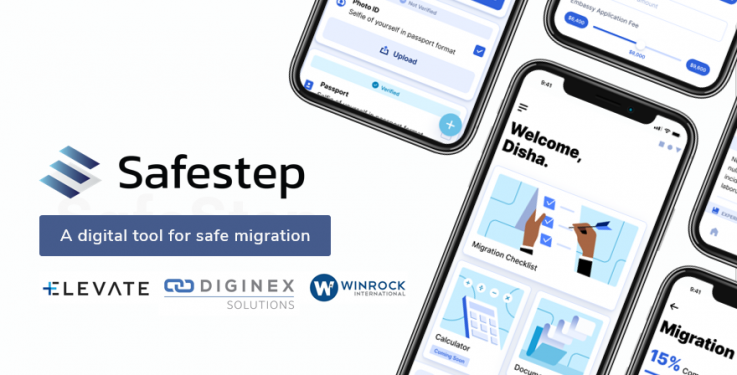SafeStep: Transforming the international migration and recruitment system
SafeStep: Transforming the international migration and recruitment system with a digital tool that supports Bangladeshi migrant workers
Bangladesh sends over 400,000 workers overseas for employment each year, making it one of the world’s primary sending countries of international migrant workers. Even amid the COVID-19 pandemic, workers from Bangladesh are still migrating overseas to seek better employment opportunities and sending remittances back home to support their families.
According to the International Organization for Migration (IOM), an estimated 10 million+ Bangladesh nationals are currently working abroad, primarily as low-skilled laborers in the Gulf Cooperation Council (GCC) countries. Bahrain, Qatar, Saudi Arabia, United Arab Emirates (UAE), Kuwait, and Oman are key destination countries for Bangladeshi workers and employ migrant workers in a variety of sectors including construction, domestic work, and hospitality. In these destination countries, Bangladeshi migrant workers earn on average $400 per month – far more than they would make doing the same jobs at home. Earnings that overseas migrant workers send home (remittances) provide a significant, measurable boost to household incomes in Bangladesh, between $300 and $600 per month.
Despite the opportunities and financial benefits that overseas employment provides to thousands of Bangladeshis each year – and despite governmental and other efforts to promote safe migration – Bangladeshi migrant workers remain vulnerable to exploitation at all stages of the migration process. Migrant workers are frequently subjected to excessive recruitment fees, contract substitution, document retention, debt bondage, and in extreme cases, exploitation amounting to forced labor and modern slavery.
Over the past 18 months, ELEVATE and partners Winrock International and Diginex Solutions have come together – with the support of funding from the Global Fund to End Modern Slavery (GFEMS) and the UK’s Foreign, Commonwealth & Development Office – to develop SafeStep, an app that serves as a digital tool for safe migration. The app officially launched in June 2021 and is now available for download on the Google Play Store. Since its launch, the app has been downloaded over 200 times and we expect to see a further uptick in these numbers as migrants continue to seek overseas employment, despite the impact that COVID-19 has had on international labor migration.

The SafeStep app is designed to build workers’ understanding of their rights and the potential economic trade-offs before deciding to migrate. The app’s content is designed to help migrant workers understand what to expect throughout the migration journey – with a current focus on the migration corridor between Bangladesh and the GCC, but with plans to adapt to other key migration corridors such as Bangladesh and Malaysia.
SafeStep’s end-to-end support begins before a worker decides to migrate, with a budget calculator and educational content. These tools help migrants understand the potential cost of relocating for a job and provide accessible information on what to expect during the recruitment process. Support continues after a worker decides to migrate overseas, with a blockchain-enabled tool for migrants to upload and store documents like contracts, visas, and receipts for any fees or costs paid. Finally, the app includes a help center where workers can report and receive support on issues or concerns in their migration process.
Migrant workers are increasingly reliant on digital tools and technology to support every step of their recruitment and migration journeys and maintain contact with a support network, including loved ones back home. SafeStep is one such digital tool that empowers migrant workers to make their own decisions. SafeStep aims to provide important insights for better decision-making and reduces the likelihood that migrant workers end up in exploitative labor working situations – taking the industry one step closer to ending labor exploitation and modern slavery.
These blogs are written by ELEVATE staff members or associates and the views and opinions expressed are not necessarily those of ELEVATE.